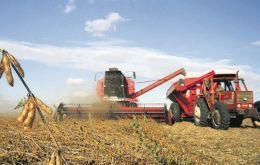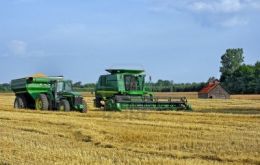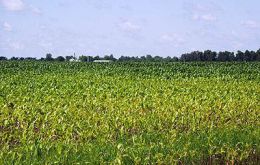MercoPress. South Atlantic News Agency
Tag: soybean
-
Thursday, September 26th 2013 - 06:21 UTC
Argentina expects at least 50 million tons of soy and 30 million of corn in 2013/14

Argentina’s 2013/14 soybean crop will be above 50 million tons while corn can be expected to reach 30 million tons, according to the country’s Agriculture minister Norberto Yauhar, based on preliminary production estimates. The minister also advanced that caps on wheat and corn exports could be lifted in the near future.
-
Wednesday, July 31st 2013 - 06:00 UTC
Brazil’s next soybean crop expected to increase 9% to a record 89.1 million tons

Brazil’s 2013/14 soybean crop that starts planting in September is expected to grow by 9% under normal weather conditions to a record 89.1 million tons, local crop analyst AgRural said in a release.
-
Thursday, July 18th 2013 - 08:45 UTC
Argentina 2012/2013 crop expected to reach a record 105 million tons says Cristina Fernandez

Argentina’s 2012/2013 grain and oilseed crop reached a record 105 million tons, announced President Cristina Fernandez underlining the excellent performance of the maize harvest and yields.
-
Monday, June 10th 2013 - 20:41 UTC
Argentina celebrates: China accepts three GM types of soybean for consumption

China approved three genetically modified soybean types for consumption, including the RR2BT seed resistant to the imidazolinonas and the glufosinat-ammonium herbicides. The announcement was made following a meeting between Agriculture ministers from Argentina and China in Beijing.
-
Thursday, May 23rd 2013 - 02:10 UTC
Argentine ports strike stalls oilseed and grains exports at peak harvest time

Argentine longshoremen on strike at the peak of summer harvests exports have scores of grains ships delayed in and around due to a three-day-old conflict that threatens to bog down shipments at a time of heightened world demand for South American soy and corn, according to industry sources.
-
Tuesday, May 14th 2013 - 18:32 UTC
Monsanto wins leading soybean seed replicating case to the relief of biotechnology industry

In a decision that drew sighs of relief from the biotechnology industry, the US Supreme Court ruled that an Indiana farmer violated agribusiness company Monsanto Co’s patent for a type of soybean. The court agreed unanimously with Monsanto that Vernon Bowman, 75, had performed an end-run around the law when he used the company’s patented soybean seeds without seeking a licence.
-
Thursday, February 28th 2013 - 01:50 UTC
Argentine soy bean crop despite late rainfall expected to reach 48 million tons

The Rosario Chamber of Commerce estimates Argentina’s soy production at 48 million tons, which is 9.4% below the 2012/13 harvest estimate of January, 53 million tons, mainly because of a prolonged drought which extended from early December to mid February.
-
Thursday, January 3rd 2013 - 15:46 UTC
Uruguay exports in 2012 reach 8.7bn dollars, a new numerical record

Uruguay exports increased 9% last year over 2011 reaching 8.751 billion dollars a numerical historic record according to the primary figures released by the Instituto Uruguay XXI, a government funded organization to promote foreign trade. Soybeans, beef and rice remain as Uruguay’s main export items.
-
Thursday, December 27th 2012 - 06:01 UTC
Xmas rainstorms and soggy soil delaying soy and corn planting in Argentina

Christmas rainstorms across Argentina further delayed soy and corn planting, keeping markets guessing about whether the grains powerhouse can produce enough this season to help bring high-flying global food prices down to earth.
-
Friday, November 23rd 2012 - 13:10 UTC
Argentina wheat forecast down because of flooding in key parts of farm belt

Argentina's government cut this season's wheat output forecast, citing three months of heavy rains that started in August and flooded key parts of the Pampas farm belt, the Agriculture Ministry said on Thursday.
